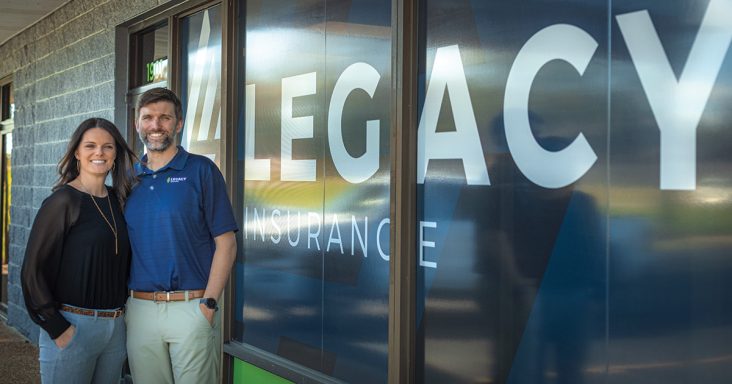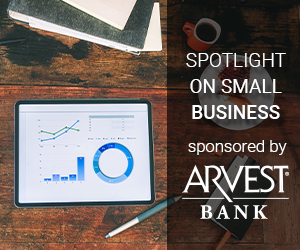Pod Squad: Jonesboro-based insurance business turns to podcast for promotion
by May 6, 2021 9:30 pm 797 views

Courtney & Tyler Watkins.
Tyler Watkins studied marketing in college, but when he graduated he couldn’t find a marketing job that suited him. He spent several years working in physical therapy, while his wife, Courtney, worked in the insurance industry.
Courtney was able to acquire Legacy Insurance based in Jonesboro. The purchase allowed Tyler to move to Legacy, and one thing that interested him was marketing the family business. He wondered how effective traditional forms of advertising would be for an established insurance business.
He loves to listen to podcasts, and one day decided to buy advertising with an Arkansas-based, true crime podcast, “Diamond State: Murder Board.” The response prompted him to start his own podcast, “The Legacy Lowdown,” a vehicle to interview local businesspeople and personalities, he told Talk Business & Politics.
“I listen to a lot of podcasts,” Watkins said. “When I got here, I asked myself a question. How do people find us? Are there other and better ways to reach them? That’s when I decided to sponsor the ‘Diamond State: Murder Board’ podcast.”
The podcast market is large and growing, according to smallbizgenius.net. An estimated 144 million people in the U.S. listen to podcasts. That’s 20 million more than listened in 2018. About 67% of podcast listeners are between the ages of 18-44, and nearly 10% of all content that Millennials consume is in the form of podcasts, according to Buzzsprout, a podcast hosting site.
About half of podcast listeners come from homes with an annual income of $250,000. Listeners are more likely to listen to ads on podcasts than on any other medium. According to Business Insider, 55% of podcast listeners pay attention to podcast ads, which is 10% more than those who pay attention to ads on the radio. Most podcast listeners don’t skip ads, mostly because they are seamlessly integrated into the program and usually read by the host.

Podcast Insights estimates there are more than 850,000 active podcasts. That’s a 75% jump during the past three years. People listen to podcasts for a variety of reasons. Some listen to learn new things, while others say they listen to them because it is easy to multitask while listening to one. Podcasts are often a favorite for those who are traveling on long trips.
Podcast creation adviser Deborah Deras recently held a webinar with the Arkansas Small Business and Technology Center (ASBTDC). During her presentation she outlined the promises and pitfalls podcasts can provide for businesses. The primary reason a business should consider a podcast is to build their brand, not necessarily make money from the podcast, she said. Some podcasts do make money through advertising, product placement, donations, merchandise and others.
The COVID-19 pandemic is having an impact on how people consume information and entertainment. Many people have been stuck at home for a year or more and fatigue is setting in when it comes to watching shows on streaming services such as Netflix. Another phenomenon is creeping in.
“In 2021, people don’t like to read,” Deras said. “People are not reading as much as they used to. Podcasts are becoming a new form of blogging. This is a new way to get your voice out there.”
A good podcast can generate leads for a business, she said. To be successful, it must be focused so listeners know what to expect each time they listen. The ideal time frame for a podcast is about 22 minutes of pure content. Most people can’t concentrate beyond that time, she added.
For businesses that are just getting started with their podcasts, she advises they record at least six in advance. When a business decides to start a podcast, the owners must make a couple of key decisions. First, what type of podcast will it be? Many podcasts bring in guests to be interviewed, while others are just the host or hosts talking about a subject. A podcast originator must also decide how they want to brand themselves. For example, do they want to be an expert in a particular field or do they want to promote a product or service?
Finding the right space and equipment to record are crucial elements, she said. Producing and editing can be difficult, and if a business doesn’t have those resources in house, there are companies that will provide those services for a fee.
Tyler said his decision to start a business-oriented podcast was cemented after he bought the sponsorship. He and his wife got feedback from customers and potential customers and it was encouraging, he said.
The Watkins hope their podcast will help Legacy’s social media presence. Courtney knew they needed a better social media presence but wasn’t sure how to accomplish that. When her husband made her listen to a podcast called “Hell and Gone,” she was hooked. She soon realized the value and potential a podcast could bring to Legacy.
“He dragged me in and made me listen,” she said with a laugh.
They plan to build a small studio at their office. Legacy will be promoted to a certain degree on their show, but Tyler said he wants to focus on his guests and their stories. He started recording in late April and hopes to have his podcast airing episodes by mid-May at the earliest. Producer Andrew Brown is helping produce and create the initial episodes.
One thing Tyler’s focused on is learning how to question guests and keep the conversation flowing. He will have a co-host, Katie Spencer.
A life-long resident of the area, Tyler said he knows there are many people in the area with interesting stories to tell and his hope is to capture some of them.
Is he worried about any aspect of podcasting?
“Yup. Hearing my own voice,” he said with a laugh. “That’s probably the only part I won’t like. Hopefully, our guests will say so much that I won’t have to say much at all.”
